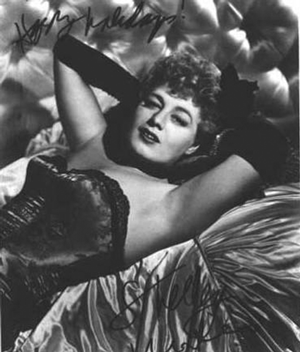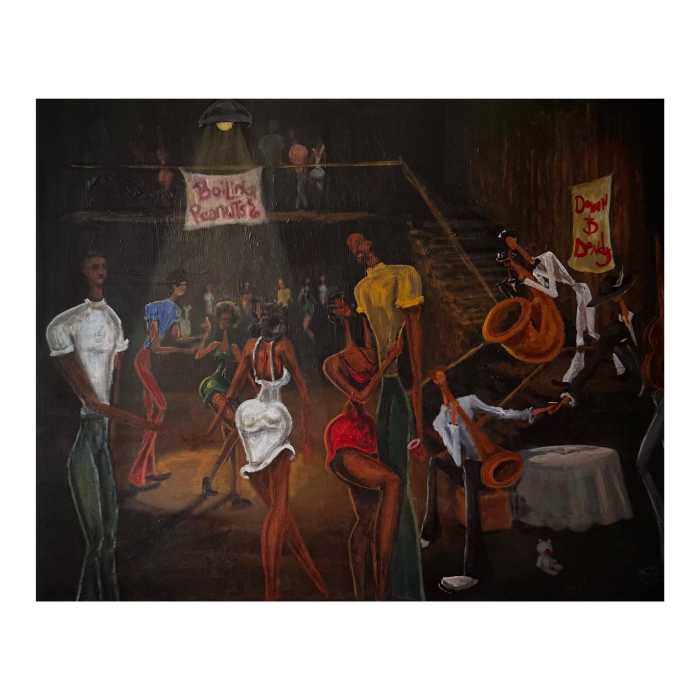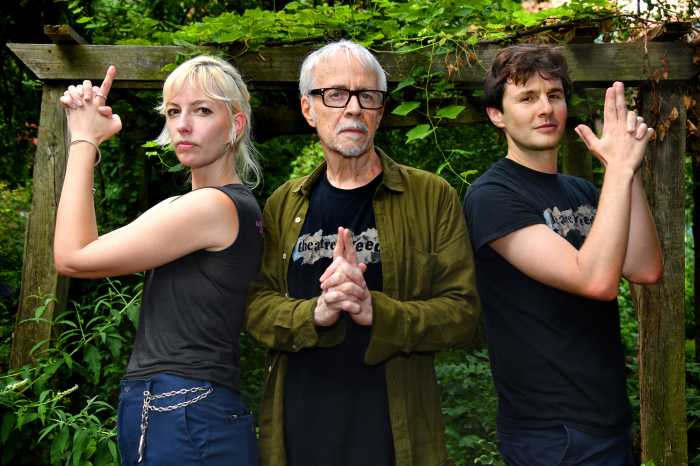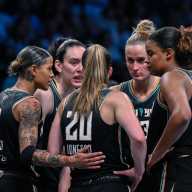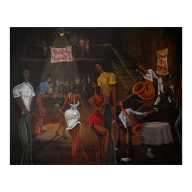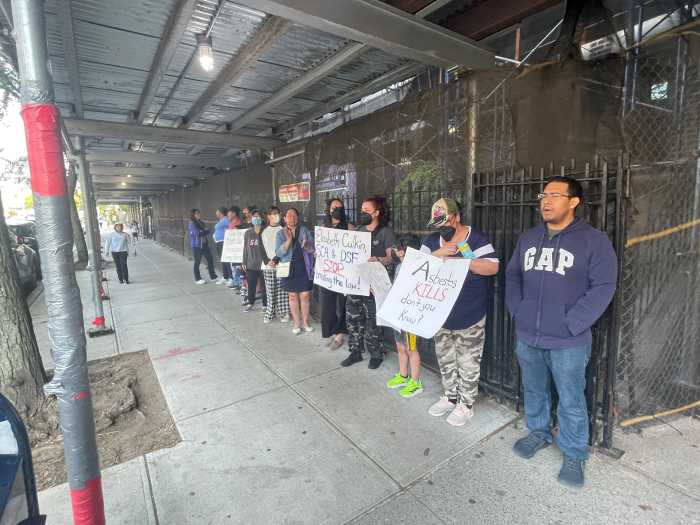By Jerry Tallmer
The screen and stage lost two very talented stars when Shelley Winters (left) and Anne Meacham (below) passed away last weekend.
Two unforgettable American actresses died this past weekend. One of them got four full Sunday columns in The New York Times, and deserved it. One of them had to wait until Tuesday for slightly quieter interment.
“I was trying to think of one word that would evoke Shelley Winters,” another very special actress, Marian Seldes, said over the phone. “And the word I came up with is generosity. Generous in her work, on the stage, in films, in her life, her politics, everything.”
Marian Seldes and Shelley Winters were only in one play together — a drama that this writer happened to see when it was done in Fort Lee, New Jersey, in the 1950s. It was Frank Corsaro’s autobiographical “A Piece of Blue Sky,” going back to his younger years, and it was marvelous. Al Morgenstern played the Corsaro character’s father, Marian Seldes played his mother, and Shelley Winters played the woman the father had an affair with. Corsaro himself was the director.
“I’ll tell you what happened,” Ms. Seldes said now. “At that time I was living in Hollywood. Shelley called from New York and said she wanted me to do the part. I said: ‘But I can’t possibly, I’m out here in California with my young daughter.’ Shelley said: ‘Bring your little girl and stay with me.’ I said: ‘I don’t think my husband would like it.’ Shelley said: ‘Let me talk to him’ — and she did.
“Well, I got on the plane with my daughter, and throughout the run of the play we stayed with Shelley in her beautiful Central Park West apartment, and every day we’d go down and get in her car and Shelley herself would drive it out to Fort Lee.
“During the whole experience, I never ever felt I was in the company of a movie star. What was wonderful about Shelley was her enthusiasm for life, and how she always fought for what was right.”
Under her wing
One stray line in the extensive biographical notes on Shelley Winters on the Internet Movie Data Base simply reads: “Godmother of Sally Kirkland.”
“We used to loosely use the term ‘godmother,’ ” said Ms. Kirkland, also by phone — from California — “but in fact she was sort of my surrogate mother. In the early 1960s I was very insecure as the dysfunctional daughter of alcoholic parents. My mother worked so hard at Time/Life, she had very little time for me.
“Shelley took me in at 18. I’d been a ‘premie,’ and fell a lot. There were quite a few car crashes. When they asked for next of kin, I’d say Shelley Winters. She’d come to the ER and pick me up.
“She taught me acting, I’d feed her lines. She taught me comedy; how to laugh. Got me into the Actors Studio. I honestly don’t think I could have survived without help from her.
“In 1968 I was dating Robert De Niro. She saw right away that he was the shyest person in the world, but obviously very talented. She brought him to Roger Corman, who was about to make ‘Bloody Mama’ and said: ‘I want Bobby to be my son.’ [“Bloody Mama,” about 1930s outlaw Ma Barker and her four boys, put Robert De Niro on track for fame.]
“In 1972 I came out to Beverly Hills and became Shelley’s assistant and protégé. She took me to Schwab’s [drugstore] every day and told everybody: ‘Here’s a great talent.’ With that kind of p-r going for me, how could I lose?
“I learned everything from her,” said Ms. Kirkland. “How to be outrageous, outspoken, political. She made me study Eleanor Roosevelt. She did a lot of work for Bobby and Jack Kennedy, Eleanor Roosevelt, and Martin Luther King. She said no actor can be any good who doesn’t recognize the headlines in the newspapers every day.
“In Holland she ran into Mr. Frank and gave him her Oscar for her performance as Mrs. Van Daan in ‘The Diary of Anne Frank.’ Shelley wanted to change the world. She thought it was out of balance; the rich were getting richer, the poor getting poorer.
“What she taught me more than anything was to stand up and fight. She was the one star the studio bosses were terrified of, but she loved her fans. I don’t even have an autograph of Shelley’s. I was too busy getting them for other people.”
Thus Sally Kirkland on Sunday afternoon, a few days before she’d be heading to Sundance for the premiere of “Off the Black,” a new movie in which she costars with Nick Nolte and Timothy Hutton.
At 7:30 p.m. Friday, January 13, 2006, Shelley Winters, who had had a massive heart attack three months ago, received last rites at the Rehabilitation Centre of Beverly Hills. Delivering those rites was the woman — one of her caretakers — who for 38 years now has, with all else, been the Reverend Sally Kirkland of the Church of the Movement of Spiritual Inner Awareness. At 8:30 p.m. Shelley Winters and Jerry DeFord, her companion of the past 17 years, were blessed in prayers by the Reverend Kirkland. At 6 a.m. Saturday, Shelley Winters passed into eternity.
The New York Times gives her place of birth (83 or maybe 85 years ago) as St. Louis. The Internet Movie Data Base says East St. Louis. I rather think it was the latter. St. Louis is Midwest gentility. East Saint Louis, at least when I was stationed near there at the time Shelley Winters was just entering movies, was a working-class, lower-middle-class venue if ever there was one. And that, no matter what she was playing, from sex queen to sacrificial victim — Myrtle Wilson in “The Great Gatsby,” Alice Tripp in “A Place in the Sun” — is what gave Shelley Winters her verisimilitude, her authenticity, her brass, and her heartbreaking sweet sexual vulnerability. She once, when they were both unknowns, roomed in Hollywood with Norma Jean Baker before the construct of Marilyn Monroe. The secret, it occurs to me today, is that Shelley Winters (born Shirley Schrift) was the real Marilyn Monroe.
Another leading lady’s exit
“Did you hear?” Marian Seldes said on the phone. “Anne Meacham also died. On Friday.”
I had not heard – or read.
Anne Meacham (1925-2006) was one of the truly brilliant actresses at the start of the Off-Broadway movement of the 1950s. Anyone who saw her ravaged, harrowing Catherine Holly in the 1958 premiere of Tennessee Williams’s “Suddenly Last Summer” at the York Playhouse — reliving before her eyes, and ours, the horrific death of Sebastian Venable — will never forget it; I certainly have not. Elizabeth Taylor’s Catherine Holly was but a pale replica.
Two years after “Suddenly Last Summer,” Anne Meacham created in flesh and blood — at David Ross’s crucial little Ibsen-Chekhov-Strindberg theater on East 4th Street — what to me is still the definitive, slow-burning, high-tension Hedda Gabler.
She herself was nothing if not high strung. She adored cats, and was in fact rather like a cat in beauty, movement, guarded-window eyes, and independence.
We gave her Obie Awards for each of those performances. I wish there were some award to bring her back to life, and work.



